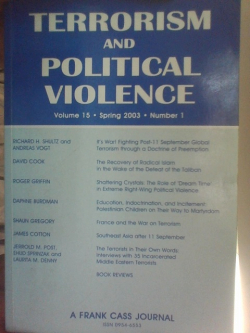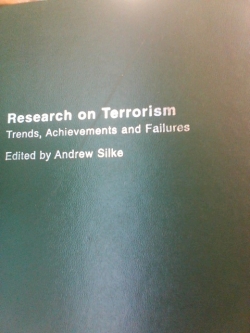The Democratic Experience and Political Violence

Buy online ($)
Type
Book
Authors
RAPOPORT ( David C. Leonard Weinberg )
ISBN 10
0714651508
Category
303.62 Social Processes-Political Violence
[ Browse Items ]
Publication Year
2001
Publisher
Frank Cass Publishers, United States
Pages
378
Subject
1. Political violence 2. Democracy.
Abstract
This collection brings together distinguished scholars who have come to believe that democracies have a special proclivity to stimulate political violence. Cold War preoccupations and tendencies to ignore historical experiences have obscured this characteristic, as has a naive assumption that when appropriate peaceful means for settling disputes are provided, the "need" and thus the likelihood for violence dissipates. But the more we know about this feature of democracy the more effective our responses will be.
The violence associated with elections is the dominant concern, analyzed on a general level and in particular case studies, such as in Israel, Italy, eastern Europe and the US. Forms of violence more conspicuous in, but not exclusive to democratic states receive special attention, for instance ethnic strife, riots, and terrorism. The focus is on national politics, but the impact of democratic institutions in shaping international responses to violence receives attention too.
Finally, some very general issues are scrutinized. What does a persistent history of violence signify for national developments? Why do democracies have a proclivity for violence and can one make sense of Thomas Jefferson's dicta that democratic states need violence periodically to sustain themselves?
The violence associated with elections is the dominant concern, analyzed on a general level and in particular case studies, such as in Israel, Italy, eastern Europe and the US. Forms of violence more conspicuous in, but not exclusive to democratic states receive special attention, for instance ethnic strife, riots, and terrorism. The focus is on national politics, but the impact of democratic institutions in shaping international responses to violence receives attention too.
Finally, some very general issues are scrutinized. What does a persistent history of violence signify for national developments? Why do democracies have a proclivity for violence and can one make sense of Thomas Jefferson's dicta that democratic states need violence periodically to sustain themselves?
Description
An incisive analysis of the connections between democracy and violence by acknowledged experts in the field. The connection between the two activities has often been largely ignored because of a widespread reluctance among democrats to consider the possibility that democratic forms perhaps encourage violence. This challenging volume opens up the debate. - from Amzon
Biblio Notes
Table of Contents
Introduction David C. Rapoport and Leonard Weinberg…….........................p. 1
1.Elections and Violence David C. Rapoport and Leonard Weinberg.............p. 15
2.Electoral Regimes and the Proscription of Anti-democratic Parties
John E. Finn .........................................................................................p. 51
3.Violence and Electoral Polarization in Divided Societies:Three
Cases in Comparative Perspective Adrian Guelke .....................................p. 78
4. Should Self-determination be Legalized? Daniel Philpott.....................p. 106
5. Democracy, Commitment Problems and Managing Ethnic Violence:
The Case of India and Sri Lanka Martha Crenshaw ...................................p. 135
6. Western Democracies and Islamic Fundamentalist Violence
Raphael Israeli.......................................................................................p. 160
7. Purity is Danger: An Argument for Divisible Identities Anna Simons.......p. 174
8. Violence in the Name of Democracy: Justifications for
Separatism on the Radical Right Michael Barkun .......................................p. 193
9. Extremism and Violence in Israeli Democracy Ehud Sprinzak...............p. 209
10. Violence and Democracy in Eastern Europe Andrzej Korbonski.............p. 237
11. Violence and the Paradox of Democratic Renewal: A Preliminary
Assessment Victor T. Le Vine ................................................................p. 261
12. The Italian Regions and the Prospects for Democracy
William Eubank and Leonard Weinberg ......................................................p. 293
13. Originary Democracy and the Critique of Pure Fairness Eric Gans...........p. 308
14. The Political Context of Terrorism in America: Ignoring
Extremists or Pandering to Them? Christopher Hewitt................................p. 325
15. Democracy and the Black Urban Riots: Rethinking the Meaning of
Political Violence in Democracy Abraham H Miller and Emily Schaen.............p. 345
16. Conclusions David C. Rapoport and Leonard Weinberg……...................p. 362
17. Notes on Contributors………………………………………....................................p. 367
Introduction David C. Rapoport and Leonard Weinberg…….........................p. 1
1.Elections and Violence David C. Rapoport and Leonard Weinberg.............p. 15
2.Electoral Regimes and the Proscription of Anti-democratic Parties
John E. Finn .........................................................................................p. 51
3.Violence and Electoral Polarization in Divided Societies:Three
Cases in Comparative Perspective Adrian Guelke .....................................p. 78
4. Should Self-determination be Legalized? Daniel Philpott.....................p. 106
5. Democracy, Commitment Problems and Managing Ethnic Violence:
The Case of India and Sri Lanka Martha Crenshaw ...................................p. 135
6. Western Democracies and Islamic Fundamentalist Violence
Raphael Israeli.......................................................................................p. 160
7. Purity is Danger: An Argument for Divisible Identities Anna Simons.......p. 174
8. Violence in the Name of Democracy: Justifications for
Separatism on the Radical Right Michael Barkun .......................................p. 193
9. Extremism and Violence in Israeli Democracy Ehud Sprinzak...............p. 209
10. Violence and Democracy in Eastern Europe Andrzej Korbonski.............p. 237
11. Violence and the Paradox of Democratic Renewal: A Preliminary
Assessment Victor T. Le Vine ................................................................p. 261
12. The Italian Regions and the Prospects for Democracy
William Eubank and Leonard Weinberg ......................................................p. 293
13. Originary Democracy and the Critique of Pure Fairness Eric Gans...........p. 308
14. The Political Context of Terrorism in America: Ignoring
Extremists or Pandering to Them? Christopher Hewitt................................p. 325
15. Democracy and the Black Urban Riots: Rethinking the Meaning of
Political Violence in Democracy Abraham H Miller and Emily Schaen.............p. 345
16. Conclusions David C. Rapoport and Leonard Weinberg……...................p. 362
17. Notes on Contributors………………………………………....................................p. 367
Number of Copies
1
| Library | Accession No | Call No | Copy No | Edition | Location | Availability |
|---|---|---|---|---|---|---|
| Main | 239 |
303.62 RAP |
1 | Yes |




